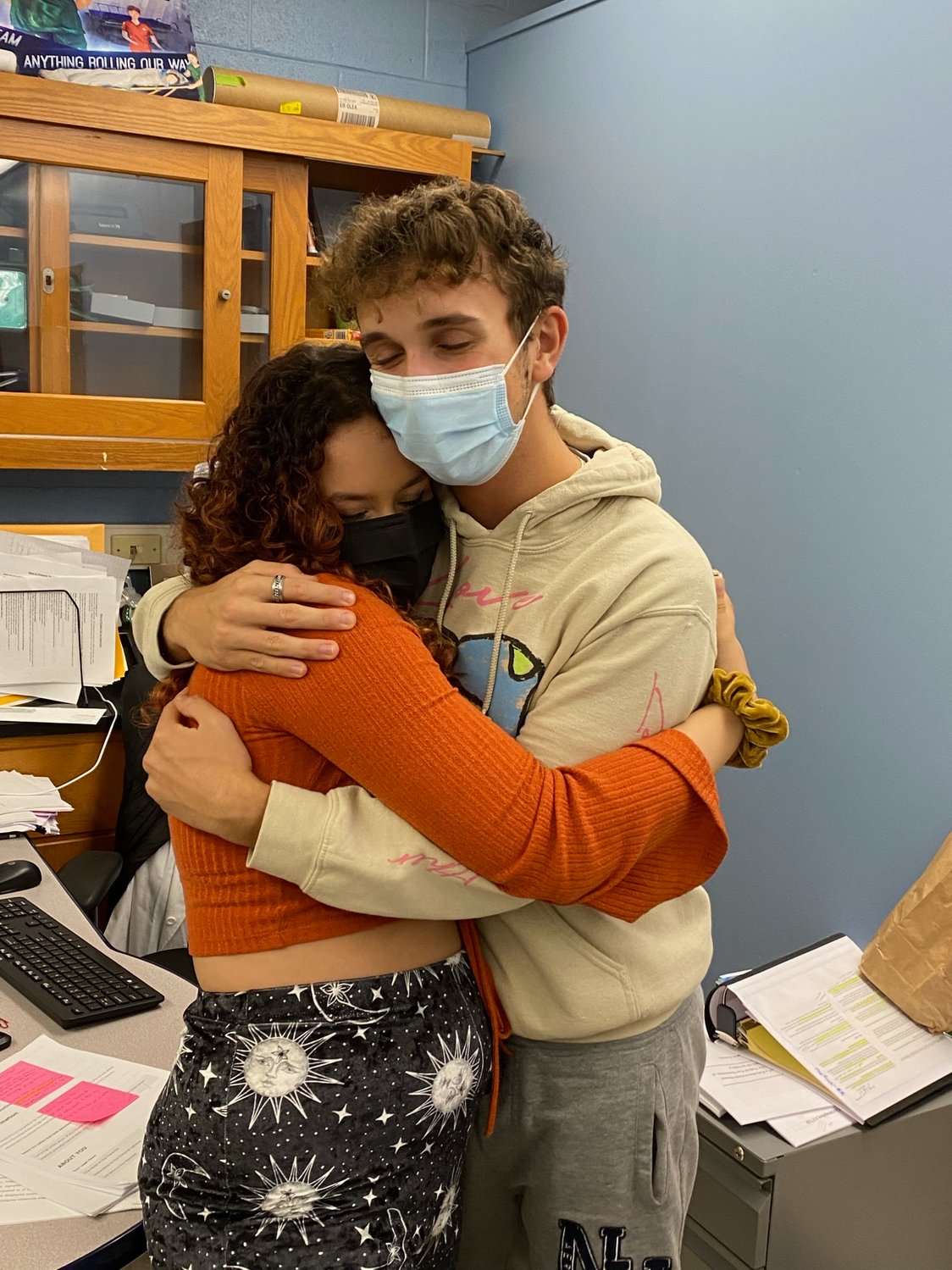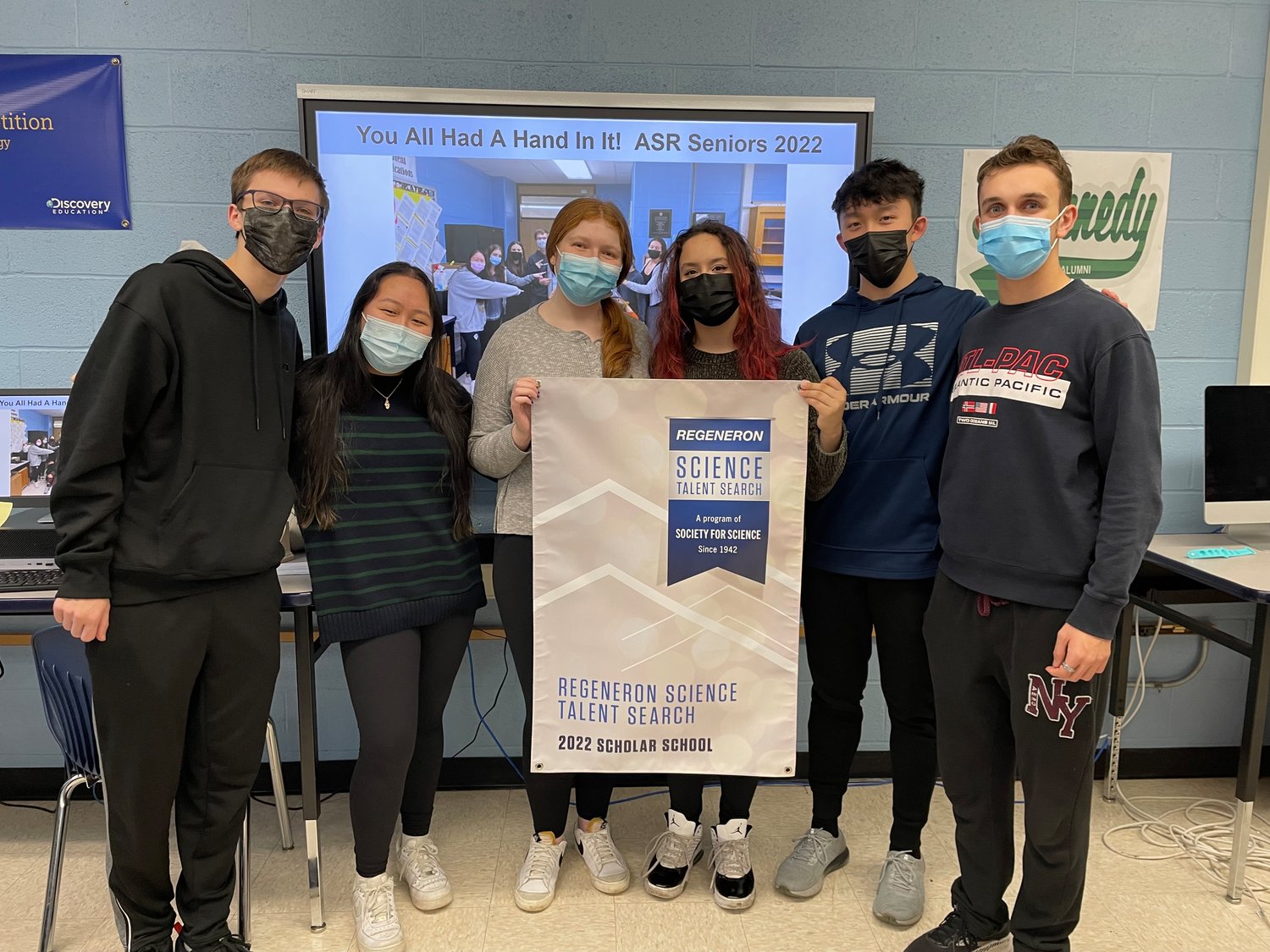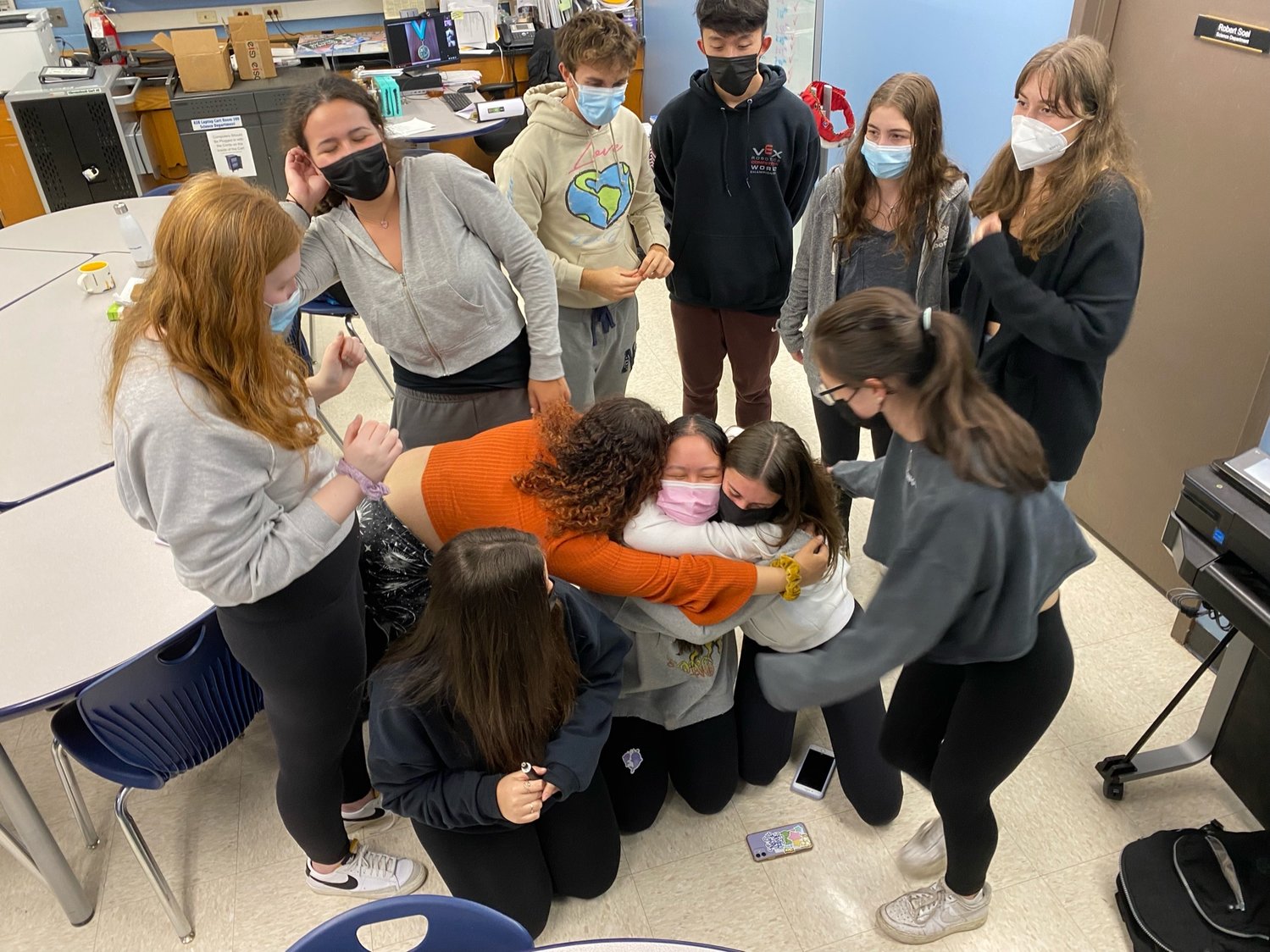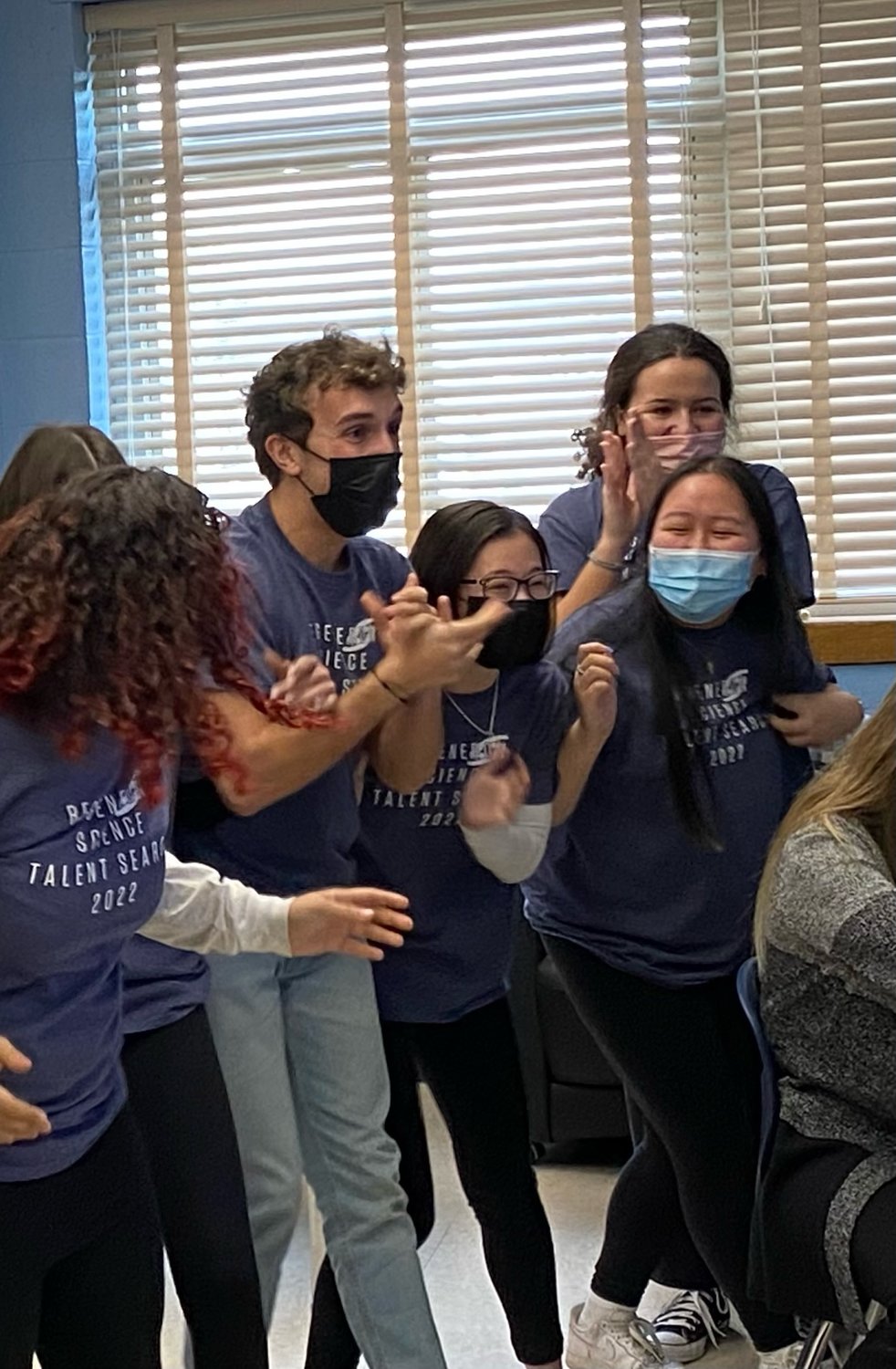Friday, April 19, 2024
 44.0°,
Mostly Cloudy
44.0°,
Mostly Cloudy
JFK seniors excel in science competition
Seniors are named Regeneron scholars
At John F. Kennedy High School, six seniors — Michelle Brown, Brandon Lin, Christopher Luisi, Christopher Prainito, Desiree Rigaud and Shannon Su — were named semifinalists in the 2022 Society for Science & Public Science Talent Search competition, sponsored by the pharmaceutical company Regeneron. Two of the six, Luisi and Rigaud, were named finalists in the competition on Jan. 20.
All enrolled in Barbi Frank’s Advanced Science Research class at Kennedy, they devoted hundreds of hours of work to their projects, starting as sophomores. A total of 12 seniors submitted project to Regeneron this school year, completing applications that are typically over 70 pages long.
“Their submissions are all incredible,” Frank said of her students. “Any one of them could’ve been a scholar.”
Each year, 300 Regeneron scholars are named semifinalists out of nearly 2,000 applicants. Each earns a $2,000 award, along with $2,000 for his or her school.
A “really close knit group,” Frank said, her students’ “hearts and souls go into their projects” — research papers accompanied by applications. Each worked with a mentor from a college or university.
Students at Kennedy must apply to be part of the ASR program as freshman, and their applications are based on two essays, grades and teacher recommendations. Two dozen students are accepted each year, although not everyone completes the course.
“It is definitely a selective process,” Frank said, “and honestly, not everyone is up to the challenge — has the grit — to be able to make it through the three years.”
The semifinalists
The semifinalists, Brown and Lin, both 17, of Merrick, and Su and Prainito, both 17, of Bellmore, reflected on how they adapted and grew as scientists amid the Covid-19 pandemic.
Attending Yale University next year, Lin, whose project examined the effect of dietary restriction and exercise on aging Drosophila melanogaster — fruit flies — had three mentor and project changes within a year.
“Because of Covid, I found out that I wouldn’t be able to work in a lab, and as a result I decided to switch gears,” Lin explained. “I went from robotics to computer science to fruit flies in the span of one year.”
For Prainito, whose project entailed creating a paper-based polymer biosensor for the Covid-19 spike protein, the pandemic ended up being the subject his research. “I was initially planning on doing a biosensor project at Tufts University on acetone in saliva, which has implications for a diabetes diagnosis, but then Covid happened and the lab was shut down,” he explained. “I decided I could switch gears, use the research and apply it to this pandemic.”
Su studied the effects of three different drugs on acute myeloid leukemia, and Brown studied the effects of metformin, an anti-diabetic drug, combined with a low-protein, high-carbohydrate diet on Parkinson’s disease symptoms.
The finalists
For the second time in Kennedy’s history, two seniors from the same class, Luisi and Rigaud, were named Regeneron Finalists.
Each will receive a minimum prize of $25,000 and an all-expenses-paid trip to Washington, D.C., March 9-16, where they will compete for more than $1.8 million in awards and a top prize of $250,000, according to the competition’s website. Forty of the 300 semifinalists are named finalists each year.
Luisi’s project — “How Dietary Restriction Affects the Athleticism, Metabolic Rate, and Lifespan of Drosophila melanogaster,” examined how a low-protein, high-carbohydrate diet affected the lifespan and overall health of fruit flies.
Luisi, 17, who lives in Bellmore, was born in Italy, and moved to the U.S. at age 10 with his father, so he could have better opportunities. The rest of his family also emigrated, he said, so his grandmother, who was fighting metastatic breast cancer, could receive better treatment, though she ultimately died of the disease.
“I made a promise to her that I was going to pursue science research and ultimately find a way to cure cancer,” he said. “That’s is why I’m so interested in science research.”
Due to Covid-19, Luisi, like many of his peers, had to change directions with his project, and faced pandemic-related challenges. “I never actually stepped foot in a lab,” he said. “I was too young — trying to keep everyone safe.” Working with a mentor at Penn State University, he eventually completed his project.
The other finalist, Rigaud, who is also 17 and also from Bellmore, initially planned to study dietary oncology. “I realized it wasn’t for me,” she said. “I was almost trying to force an interest, and ended up doing a social psychology project instead.”
Her project, “Covid-19 Induced Economic Stress: The Effect on Marital Functioning and Methods of Alleviating Financial Stress,” studied the effect of the economic downturn brought on by the pandemic on marital life, with a second portion examining the efficacy of different methods of counseling for alleviating financial stress.
“My actual inspiration for my own research came from my own family background, past economic struggles and my parents being split — and seeing how deeply people were affected by the economic downturn of Covid,” Rigaud said. “It was really alarming to me, and I just wanted to be able to help people alleviate these pains in these interpersonal relationships.”
She acknowledged that it was challenging to find participants. Because she was studying social psychology at home, however, she didn’t have as many pandemic-related struggles as her classmates.
Rigaud, who will attend Colgate University next year, elaborated on why her experience in ASR was so rewarding. “Despite it being very difficult and rigorous,” she said, “it was an amazing experience for the reasons of gaining more confidence in ourselves and our researching abilities.”
“It is an absolute pleasure to watch these kids transform into the people they are today, and it really takes a tremendous amount of dedication,” Frank said.
“We all supported each other, and unconditionally loved each other throughout the entire process,” Rigaud added. “I think that was the most rewarding part.”
HELP SUPPORT LOCAL JOURNALISM
The worldwide pandemic has threatened many of the businesses you rely on every day, but don’t let it take away your source for local news. Now more than ever, we need your help to ensure nothing but the best in hyperlocal community journalism comes straight to you. Consider supporting the Herald with a small donation. It can be a one-time, or a monthly contribution, to help ensure we’re here through this crisis. To donate or for more information, click here.
Sponsored content
Other items that may interest you













